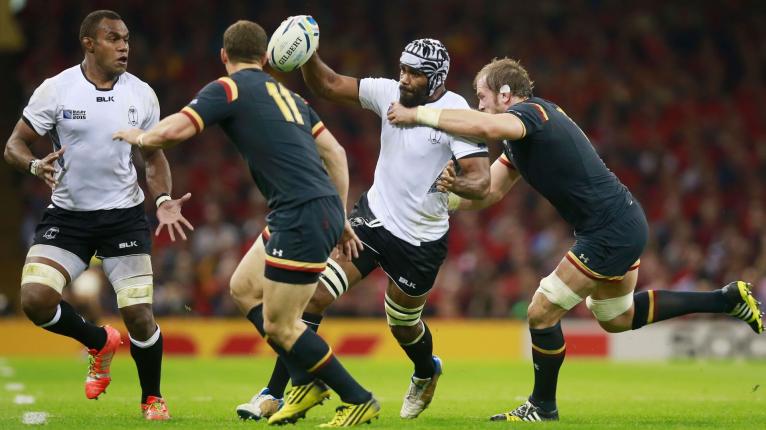Fiji's win over Maori All Blacks should have Wales and Australia on high alert

On Saturday afternoon, Fiji played their first match of the year and unequivocally announced that their World Cup opposition will need to be at the top of their game to knock over the island nation later in the season.
Fiji dispatched the Maori All Blacks with relative ease, building a 12-0 score at halftime and pulling ahead to 22-0 before ultimately triumphing 27-10.
It was Fiji’s first win over the Maori in over 60 years.
World Cup old foes
Prior to the match there was already talk that Fiji could perhaps upset Wales or Australia at the World Cup – teams that Fiji also played in the last iteration of the competition.
Australia’s recent failures have been well-documented. Last year the former world champions mustered just four wins from their thirteen matches. Their Super Rugby sides have also under-performed in recent times.
Wales have been more resolute in the last few years, claiming a grand slam in this year’s Six Nations competition. The Warren Gatland-coached side once struggled to put away southern hemisphere teams, but have won their last seven on the trot – including three victories against South Africa.
No run-away victories in recent years
Wales’ two previous encounters against Fiji have been close affairs. At the last World Cup, Wales managed a 23-13 win at the Millennium Stadium. One year prior, they recorded a 4-point win at the same venue. When Wales and Fiji do battle in 2019, Wales won’t have the benefit of playing in front of their home crowd – though countless Welsh fans will no doubt make the trip to Oita for the match.
Australia haven’t struggled quite as much against Fiji in recent years. In 2017, the Wallabies notched a 37-14 win in Melbourne whilst the result at the 2015 World Cup was much the same, with Australian running away 28-13 victors.
Still, Fiji have had considerably more professional rugby in recent times. The Fijian Drua emerged as champions of Australia’s National Rugby Championship in 2018 (the Drua’s first year in the competition) and the Fijian Latui have already played four matches this year against Samoa and the Western Force.
Saturday’s victory over the Maori All Blacks has now reinforced the belief that the Pacific Islanders could actually book a place in the World Cup quarter-finals at the expense of Australia or Wales.

Maori at a low point
It should first be noted that the Maori side that ran out over the weekend was a fair bit weaker than what we’ve come to expect.
The Maori side which was squashed by the British and Irish Lions in 2017 included eight All Blacks in the starting side, with the other seven players all having ample experience at Super Rugby level.
The team which ran out against Fiji boasted just two All Blacks in the match-day squad: Tyrell Lomax, whose sole appearance was against Japan, and Te Toiroa Tahuriorangi, who has clocked up minimal minutes over the past two seasons.
Regardless, the Maori All Blacks went into the match as favourites (at least according to the bookies) and the magnitude of Fiji’s first victory over the Maori since 1957 shouldn’t be discounted simply due to the lesser quality of their opposition.
Champagne rugby, through and through
The win was important, there’s no doubt about it – but it’s the way that Fiji played that should really be striking fear in the hearts of Welsh and Australian fans.
The Fijians showed their typical sort of reckless abandonment with throwing backdoor passes and one-handed offloads. Sometimes, these passes didn’t come off – and Fiji may find themselves victims of a number of unfavourable TMO calls when they hit the big time in Japan – but more often than not their ability to keep the ball alive kept the Maori side scrambling.
The sideline was Fiji’s enemy, going to ground was Fiji’s enemy, giving possession to the opposition was Fiji’s enemy – the islanders held onto the ball and simply out-ran and out-played the Maori All Blacks.
The whole Fijian backline was big and pacey, whilst the forward pack was strikingly similar. Captain Dominiko Waqaniburotu led the team well and kept his side’s discipline in check. Midfielder Levani Botia was probably the standout for Fiji – he was a constant threat over the ball when the Maori were in possession and delivered some silky passes to his outside runners.
All in all, this is an impressive Fiji side.
‘Home’ advantage
The climate will also better suit Fiji when they come up against Wales and Australia later this year. Japan will be incredibly humid during the World Cup, there’s no doubt about it.
The island teams will adjust much quicker than sides like Georgia and Wales to what will be one of the hottest World Cups on record – and this will give them a huge advantage over some of their opposition. Already teams are trying to prepare for the heat and humidity by training away from home, in climates closer to what they’ll experience in Japan than what they’re accustomed to in Europe.
Fiji will have to do no such thing.
2019 will see Fiji having a relatively favourable draw compared to the last World Cup. In 2015, Fiji faced England, Australia and Wales one after another, over a two-week period. This year, Fiji’s games against Australia and Wales bookend their draw, with matches against Uruguay and George in-between. The tightest turn-around they face is four days – but that’s between their games against the Wallabies and Uruguay, which won’t cause too much concern for Fiji coach John McKee.
The Fijian team are always a dangerous side to come up against during a World Cup when the squad has access to all its players from across the globe. With greater numbers of Fijian player getting professional football across the board and the team already looking as sharp as a knife, Wales and Australia better watch their back when they come up against the island side at this year’s showpiece tournament.
Check out RugbyPass’ latest documentary, on Fijian superstar Nemani Nadolo:














































































